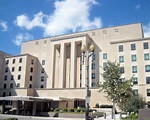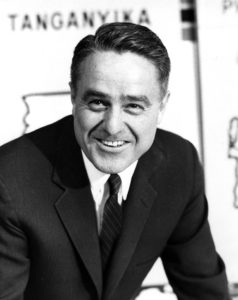The First RPCV Conference, March 1965 (Washington, D.C.)
The recent successful NPCA Conference in Denver got me thinking about the first RPCV Conference held at the State Department on March 5-7, 1965. Over 1,000 RPCVs attended, of the approximately 3,000 plus PCVs who had returned home.
By the time the conference ended, as reported in the Saturday Review, “it was beginning to dawn on even the most grudging onlooker that the Peace Corps veterans–who should number at least 50,000 by 1970–are going to be an inspiring force in our national life.” (It turned out to be closer to 75,000 RPCVs).
The article goes onto say that the “atmosphere in the State Department auditorium was one of verve, confidence, and high good humor. In fact, the witty opening speeches by Corps director Sargent Shriver and Vice President Humphrey evoked such volleys of laughter that one middle-aged journalist expressed fear for the building safety, on the grounds that State Department auditoriums are engineered to withstand everything but laughter.”
The three days were filled with sessions of serious discussions and much soul searching. A number of newspapers wrote how the RPCVs had fears and doubts, not ebullience and hopefulness. TV news commentator Eric Sevareid wrote in his newspaper column about the “Peace Corps boys and girls” suffering from ‘cultural shock’ and “bored with the trifling concerns of affluence life, depressed that their inner revelations are not shared, and angry that private employers do not leap to hire them.”
However, most observers at the conference felt the returnees did indeed have something special to offer, e.g., personal flexibility, empathy with people of different backgrounds, a renewed appreciation of democratic institutions, and optimism about the possibility of change for the better.
The panels also turned up, Hallowell Bowser wrote in his Saturday Review article, “a collection of individualists, dissenters, and cross-grain types who not only had black thoughts about the conference itself, but also had black second thought about our needing a Peace Corps at all.” He would go onto write, “Inevitably, there were a few corridor orators, one of whom kept complaining, ‘But it all seems so strange after Africa. All these buildings and people–I just can’t seem to connect.” (Which prompted one guest observer to mutter, ‘Hard cheese, old chap.’)”
The rebellious note continued on into the last plenary session, during which an RPCV woman advanced on the podium at Sargent Shriver’s invitation and readministered to Shriver the dressing-down she had already given him and the Peace Corps in private.
And then the RPCVs, in a final display of collective individuality, voted down a proposal that they set up a national returnees’ organization; the feeling being that such a group might get hardening of the veins, and end up as a log-rolling, job-exchanging fraternity of conformists.
What emerged from the conference Hallowell Bowser writes, “was the sense that the Peace Corps is causing a remarkable group of people to surface in our midst. Listening to them talk, one could understand President Johnson’s comment, ‘Thomas Hardy said war makes rattling good history, but peace is poor reading….(but) the Peace Corps (has) made the pursuit of peace rattling good history.”

What a great review of the first and last RPCV conference organized by Peace Corps Washington. It may well be that Shriver was gone from the agency after March 1st of 1966 and so his leadership was missing. I was in the Colombia at this time and all we got was the article in Time magazine. It emphasized “reverse cultural shock” and the RPCV walking the halls and muttering that he could not connect.
This successful NPCA Connect conference focused on the Third Goal and what RPCVs were doing to promote and help projects in their host countries. `The energy and enthusiam was contagious! However, I for one, would welcome a RPCV Conference where we do have sessions of serious discussions and much soul searching – where we could talk openly and constructively about everything we say to each other over coffee or the “iconic” beer that staff was always going to buy for us so we could “tell them what we thought.”
There is so much talent and experience in the RPCV community. I wish that could be highlighted and we could talk about Peace Corps.
The comment that returned volunteers were “angry that employers did not leap to hire them” must have been fake news. I read a study reporting that Peace Corps Service was a better predictor of success than a Fulbright. Most employers are looking for people who can complete a job without much direction, don’t need a lot of support, can work in difficult environments, and don’t complain about the air conditioning or the lunch choices.
Like Joanne, I too was still a Rual CARE/Peace Corps Volunteer in Colombia, 1964-1966. Going back to Los Angeles in 1974 after serving as staff in Colombia, I found RPCV’s gathering on weekends. The Los Angeles Regional office was the focal point and home for the Returned Volunteers…before NPCA. Gene Tackett was the PC Regional Manager and India RPCV…Gene and his great staff brought us all together often. Sarge visited the group after he was no longer the Director, but his spirit was still as strong. His famous words are still as real as ever…even for Trainees as they begin Training:
“The Peace Corps is guilty of enthusiasm and a
crusading spirit…But we’re not apologetic about it!”
Bob
I vividly recall the conference since I was one of the first half dozen RPCVs to join the Foreign Service at State. I was at the time teaching school in DC and waiting for my entering class in June. I recall lots of people warning about Vietnam at the conference and believe some wanted to issue a statement about not going to war there.
How were the 1000 attendees chosen?
Mary, I think that RPCV who wanted to attend, could.
No, I think you had to be invited.
Anyone could attend and, in fact, the Peace Corps paid for “RPCVs Representatives’ from different groups to attend. The Conference was not paid for by the government but from private donations. I have a list of them if you want to know who they were.
Thanks, John. I was probably thinking about the RPCV reps who were paid — and thus presumably invited. But how were they chosen? 🙃
Mary, I believe they were selected by their groups. But I don’t know. I do know that they were not selected by Peace Corps Washington.
Thanks again, John. Sounds a bit unwieldy, which wouldn’t be unusual. Just curious.